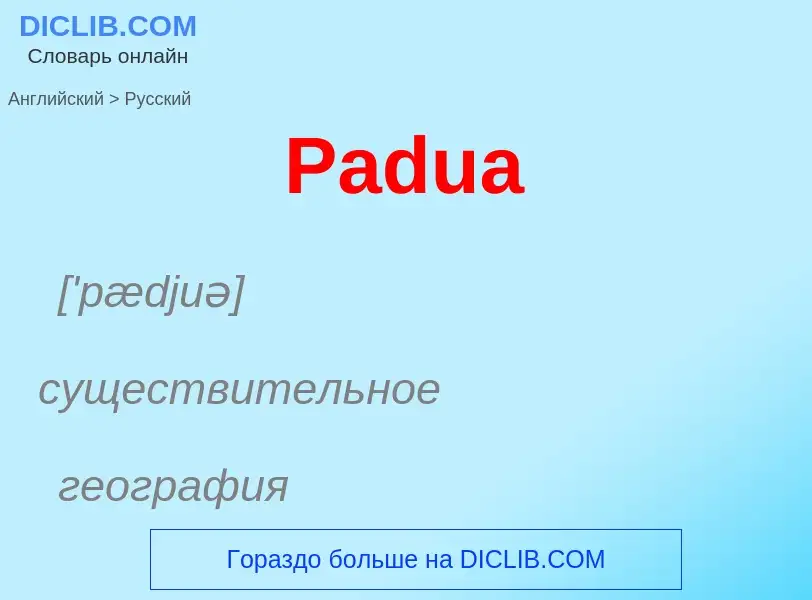Перевод и анализ слов искусственным интеллектом ChatGPT
На этой странице Вы можете получить подробный анализ слова или словосочетания, произведенный с помощью лучшей на сегодняшний день технологии искусственного интеллекта:
- как употребляется слово
- частота употребления
- используется оно чаще в устной или письменной речи
- варианты перевода слова
- примеры употребления (несколько фраз с переводом)
- этимология
Padua - перевод на русский
['pædjuə]
существительное
география
г. Падуя
[beni'diktin]
существительное
[beni'dikti:n]
общая лексика
монах или монахиня бенедиктинского ордена
бенедиктинец
бенедиктин (ликёр)
ликер бенедиктин
существительное
общая лексика
бенедиктинец (монах)
Определение
Википедия

Padua ( PAD-ew-ə; Italian: Padova [ˈpaːdova] (listen); Venetian: Pàdova) is a city and comune in Veneto, northern Italy. Padua is on the river Bacchiglione, west of Venice. It is the capital of the province of Padua. It is also the economic and communications hub of the area. Padua's population is 214,000 (as of 2011). The city is sometimes included, with Venice (Italian Venezia) and Treviso, in the Padua-Treviso-Venice Metropolitan Area (PATREVE) which has a population of around 2,600,000.
Padua stands on the Bacchiglione River, 40 kilometres (25 miles) west of Venice and 29 km (18 miles) southeast of Vicenza. The Brenta River, which once ran through the city, still touches the northern districts. Its agricultural setting is the Venetian Plain (Pianura Veneta). To the city's south west lies the Euganaean Hills, praised by Lucan and Martial, Petrarch, Ugo Foscolo, and Shelley.
Padua appears twice in the UNESCO World Heritage List: for its Botanical Garden, the most ancient of the world, and the 14th-century Frescoes, situated in different buildings of the city centre. (An example is the Scrovegni Chapel painted by Giotto at the beginning of 1300.)
The city is picturesque, with a dense network of arcaded streets opening into large communal piazze, and many bridges crossing the various branches of the Bacchiglione, which once surrounded the ancient walls like a moat.
Saint Anthony, the patron saint of the city, was a Portuguese Franciscan who spent part of his life in the city and died there in 1231.
Padua is home to one of the oldest universities in the world, the University of Padua, founded in 1222 and where figures such as Galileo Galilei and Nicolaus Copernicus have taught or studied. Today, the university has around 65,000 students and has a profound impact on the city's recreational, artistic and economic activities.
Padua is the setting for most of the action in Shakespeare's The Taming of the Shrew. There is a play by the Irish writer Oscar Wilde entitled The Duchess of Padua.
Its inhabitants sometimes call Padua "the city of the three withouts," because it is home to the "cafe without doors" (the Pedrocchi Café, which traditionally never closed), "the meadow without grass" (the Prato della Valle, a former bog that has been converted into one of the largest squares in Europe), and the "saint without a name" (because Paduans traditionally refer to Saint Anthony of Padua simply as "the Saint").


!['Most Serene Republic']] 'Most Serene Republic']]](https://commons.wikimedia.org/wiki/Special:FilePath/Clock tower and Lion of St. Mark in Padova - just like the ones in Venice.jpg?width=200)
![The unfinished façade of [[Padua Cathedral]] The unfinished façade of [[Padua Cathedral]]](https://commons.wikimedia.org/wiki/Special:FilePath/Duomo (Padua) - Facade.jpg?width=200)
![Palazzo della Ragione]] Palazzo della Ragione]]](https://commons.wikimedia.org/wiki/Special:FilePath/Exterior of Palazzo della Ragione (Padua).jpg?width=200)
![''Last Judgment'' by [[Giotto]], part of the [[Scrovegni Chapel]] ''Last Judgment'' by [[Giotto]], part of the [[Scrovegni Chapel]]](https://commons.wikimedia.org/wiki/Special:FilePath/Giotto, diavolo.jpg?width=200)

![Remnants of Padua's [[Roman amphitheatre]] wall Remnants of Padua's [[Roman amphitheatre]] wall](https://commons.wikimedia.org/wiki/Special:FilePath/PadovaAnfiteatro1.jpg?width=200)

![The [[Basilica of Saint Anthony of Padua]] The [[Basilica of Saint Anthony of Padua]]](https://commons.wikimedia.org/wiki/Special:FilePath/Sant'Antonio (Padua) - Facade.jpg?width=200)
![[[Tomb of Antenor]] [[Tomb of Antenor]]](https://commons.wikimedia.org/wiki/Special:FilePath/Tomba di Antenore.jpg?width=200)
![city's Cathedral]]. city's Cathedral]].](https://commons.wikimedia.org/wiki/Special:FilePath/Niccolò Semitecolo - Two Christians before the Judges.jpg?width=200)

.jpg?width=200)
.jpg?width=200)
 - Torre degli Anziani.jpg?width=200)
![Piazza dei Signori]] Piazza dei Signori]]](https://commons.wikimedia.org/wiki/Special:FilePath/Palazzo dell'Orologio Padova.jpg?width=200)
![[[Abbot Suger]] (c. 1081 – 1135) in a medieval stained-glass window [[Abbot Suger]] (c. 1081 – 1135) in a medieval stained-glass window](https://commons.wikimedia.org/wiki/Special:FilePath/Abbot Suger.jpg?width=200)
![[[Benedict of Aniane]] (747–821). [[Benedict of Aniane]] (747–821).](https://commons.wikimedia.org/wiki/Special:FilePath/Benedict von Nursia.jpg?width=200)

![[[Bernard of Clairvaux]] (1090–1153) featured in a 13th-century illuminated manuscript [[Bernard of Clairvaux]] (1090–1153) featured in a 13th-century illuminated manuscript](https://commons.wikimedia.org/wiki/Special:FilePath/Bernhard von Clairvaux (Initiale-B).jpg?width=200)
![[[Bonifatius Becker]] [[Bonifatius Becker]]](https://commons.wikimedia.org/wiki/Special:FilePath/BonifatiusBecker.jpg?width=200)
![Self portrait of [[Matthew Paris]] (c. 1200 – 59) Self portrait of [[Matthew Paris]] (c. 1200 – 59)](https://commons.wikimedia.org/wiki/Special:FilePath/BritLibRoyal14CVIIFol006rMattParisSelfPort.jpg?width=200)

![Dom Pérignon]] Dom Pérignon]]](https://commons.wikimedia.org/wiki/Special:FilePath/Dom Pérignon découvrant la prise de mousse.jpg?width=200)
![Friary of San Marco]] [[Florence]]. Friary of San Marco]] [[Florence]].](https://commons.wikimedia.org/wiki/Special:FilePath/Fra Angelico 031.jpg?width=200)
![Carolingian manuscript]], c. 840, depicting [[Rabanus Maurus]] (left), supported by [[Alcuin]] (middle), presenting his work to [[Otgar of Mainz]] Carolingian manuscript]], c. 840, depicting [[Rabanus Maurus]] (left), supported by [[Alcuin]] (middle), presenting his work to [[Otgar of Mainz]]](https://commons.wikimedia.org/wiki/Special:FilePath/Raban-Maur Alcuin Otgar.jpg?width=200)
![Late Gothic]] sculpture of [[Rupert of Salzburg]] (c. 660 – 710) Late Gothic]] sculpture of [[Rupert of Salzburg]] (c. 660 – 710)](https://commons.wikimedia.org/wiki/Special:FilePath/Ruperthead.jpg?width=200)


